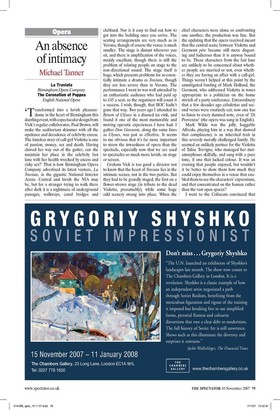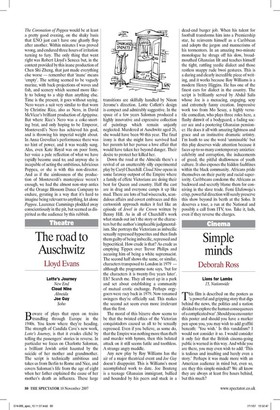An absence of intimacy Michael Tanner
La Traviata Birmingham Opera Company The Coronation of Poppea English National Opera ransformed into a lavish pleasure1 dome in the heart of Birmingham this dazzling event, with a spectacular design from Vick's regular collaborator, Paul Brown, will make the auditorium shimmer with all the opulence and decadence of celebrity excess. The timeless story of call-girl Violetta is one of passion, money, sex and death. Having clawed her way out of the gutter, can she maintain her place in the celebrity fast lane with her health wrecked by excess and risky sex?' That is how Birmingham Opera Company advertised its latest venture, La Traviata, in the gigantic National Interior Arena. Central and lavish the NIA may be, but for a stranger trying to walk there after dark it is a nightmare of underground passages, walkways, canal bridges and clubland. Nor is it easy to find out how to get into the building once you arrive. The seating arrangements are very much as in Verona, though of course the venue is much smaller. The stage is distant wherever you sit, and there is amplification of the voices, mainly excellent, though there is still the problem of relating people on stage to the non-directional sound. The stage itself is huge, which presents problems for so essentially intimate a drama as Traviata, though they are less severe than in Verona. The performance I went to was well attended by an enthusiastic audience who had paid up to £45 a seat, so the organisers will count it a success. I wish, though, that BOC hadn't gone that way. Two years ago I attended its Return of Ulysses in a disused ice-rink, and found it one of the most memorable and moving operatic experiences I have had. I gather Don Giovanni, along the same lines as Ulysses, was just as effective. It seems to me obvious that it's far more important to stress the inwardness of opera than the spectacle, especially now that we are used to spectacles so much more lavish, on stage or screen.
Graham Vick is too good a director not to know that the heart of Traviata lies in the intimate scenes, not in the two parties. But they had to be grandly staged, the first on a flower-strewn stage (in tribute to the dead Violetta, presumably), while some huge odd scenery swung into place. When the chief characters were alone or confronting one another, the production was fine. But the updating that the opera received meant that the central scene between Violetta and Germont pere became still more disgusting and ludicrous than it is anyway bound to be. These characters from the fast lane are unlikely to be concerned about whether people are married or not, even whether they are having an affair with a call-girl. Things weren't helped at this point by the unmitigated bawling of Mark Holland, the Germont, who addressed Violetta in tones appropriate to a politician on the home stretch of a party conference. Extraordinary that a few decades ago cabalettas and second verses were routinely cut; now one has to listen to every damned note, even of 'Di Provenzaf (the opera was sung in English).
Mark Wilde was the jolly, huggable Alfredo, playing him in a way that showed that complacency is an inherited trait in this severely morally challenged family. He seemed an unlikely partner for the Violetta of Talise Trevigne, who managed her metamorphoses skilfully, and sang with a pure tone, if one that lacked colour. It was an evening that people enjoyed, but wouldn't it be better to show them how much they could enjoy themselves in a venue that enabled them to see the characters' expressions, and that concentrated on the human rather than the vast open spaces?
I went to the Coliseum convinced that The Coronation of Poppea would be at least a pretty good evening, on the shaky basis that ENO just can't have one ghastly flop after another. Within minutes I was proved wrong, and endured three hours of irritation turning to fury. The only thing that went right was Robert Lloyd's Seneca but, in the context provided by this inane production of Chen Shi-Zheng, that just made everything else worse — remember that 'inane' means 'empty'. The setting seemed to be vaguely marine, with back-projections of waves and fish, and scenery which seemed more likely to belong to a ship than anything else. Time is the present, it goes without saying. Nero wears a suit very similar to that worn by Christine Rice, also as Nero, in David Mc Vicar's brilliant production of Agrippina. But where Rice's Nero was a coke-snorting brat, and only hoping to be Emperor, Monteverdi's Nero has achieved his goal, and is throwing his imperial weight about. In Anna Grevelius's performance there was no hint of power, and it was weakly sung. Alas, even Kate Royal was on poor form, her voice a pale reflection of what we have rapidly become used to; and anyway she is incapable of acting the ambitious, lubricious Poppea, or she is with this non-director. And as if the aimlessness of the production of Monteverdi's masterpiece weren't enough, we had the almost non-stop antics of the Orange Blossom Dance Company to endure, gyrating in a way that it's hard to imagine being relevant to anything, let alone Poppea. Laurence Cummings plodded away conscientiously in the pit, but seemed as dispirited as the audience by this rubbish.






































































 Previous page
Previous page